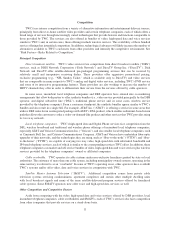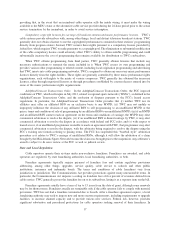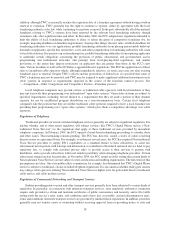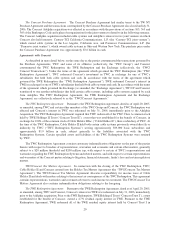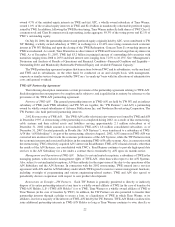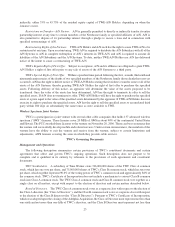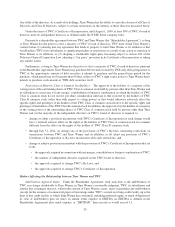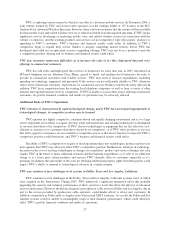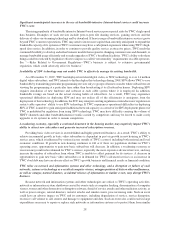Time Warner Cable 2007 Annual Report Download - page 23
Download and view the complete annual report
Please find page 23 of the 2007 Time Warner Cable annual report below. You can navigate through the pages in the report by either clicking on the pages listed below, or by using the keyword search tool below to find specific information within the annual report.addition, although TWC occasionally reaches the expiration date of a franchise agreement without having a written
renewal or extension, TWC generally has the right to continue to operate, either by agreement with the local
franchising authority or by law, while continuing to negotiate a renewal. In the past, substantially all of the material
franchises relating to TWC’s systems have been renewed by the relevant local franchising authority, though
sometimes only after significant time and effort. In December 2006, the FCC adopted new regulations intended to
limit the ability of local franchising authorities to delay or refuse the grant of competitive franchises (by, for
example, imposing deadlines on franchise negotiations). Among other things, the new rules: establish deadlines for
franchising authorities to act on applications; prohibit franchising authorities from placing unreasonable build-out
demands on applicants; specify that certain fees, costs, and other compensation to franchising authorities will count
towards the statutory five-percent cap on franchising fees; prohibit franchising authorities from requiring applicants
to undertake certain obligations concerning the provision of public, educational, and governmental access
programming and institutional networks; and preempt local level-playing-field regulations, and similar
provisions, to the extent they impose restrictions on applicants that are greater than those in the FCC’s new
rules. Various localities as well as the NCTA have appealed the new regulations. The FCC has applied most of these
rules to incumbent cable operators which, although immediately effective, in some cases may not alter existing
franchises prior to renewal. Despite TWC’s efforts and the protections of federal law, it is possible that some of
TWC’s franchises may not be renewed, and TWC may be required to make significant additional investments in its
cable systems in response to requirements imposed in the course of the franchise renewal process. See
“—Competition—Other Competition and Competitive Factors—Franchise process.”
Local telephone companies may provide service as traditional cable operators with local franchises or they
may opt to provide their programming over unfranchised “open video systems.” Open video systems are subject to
specified requirements, including, but not limited to, a requirement that they set aside a portion of their channel
capacity for use by unaffiliated program distributors on a non-discriminatory basis. Certain local telephone
companies take the position that they are neither traditional cable operators required to have a local franchise nor
providing their programming over “open video systems,” which gives them a competitive advantage over cable
operators.
Regulation of Telephony
Traditional providers of circuit-switched telephone services generally are subject to significant regulation. It is
unclear whether and to what extent regulators will subject services like TWC’s Digital Phone service (“Non-
traditional Voice Services”) to the regulations that apply to these traditional services provided by incumbent
telephone companies. In February 2004, the FCC opened a broad-based rulemaking proceeding to consider these
and other issues. That rulemaking remains pending. The FCC has, however, issued a series of orders resolving
discrete issues on a piecemeal basis. For example, over the past several years, the FCC has required Non-traditional
Voice Service providers to supply E911 capabilities as a standard feature to their subscribers, to assist law
enforcement investigations with wiretaps and information, to contribute to the federal universal service fund, to pay
regulatory fees, to comply with customer privacy rules, to provide access to their services to persons with
disabilities, and to provide subscribers with local number portability when changing telephone providers. Certain
other issues remain unclear. In particular, in November 2004, the FCC issued an order stating that certain kinds of
Non-traditional Voice Services are not subject to state certification and tariffing requirements. The full extent of this
preemption is not clear. One state public utility commission, for example, has determined that TWC’s Digital Phone
service is subject to traditional, circuit-switched telephone regulations. It is also unclear whether utility pole owners
may charge cable operators offering Non-traditional Voice Services higher rates for pole rental than for traditional
cable service and cable modem service.
Regulation of Commercial Networking and Transport Services
Entities providing point-to-point and other transport services generally have been subjected to various kinds of
regulation. In particular, in connection with intrastate transport services, state regulatory authorities commonly
require such providers to obtain and maintain certificates of public convenience and necessity and to file tariffs
setting forth the service’s rates, terms, and conditions and to have just, reasonable, and non-discriminatory rates,
terms and conditions. Interstate transport services are governed by similar federal regulations. In addition, providers
generally may not transfer assets or ownership without receiving approval from or providing notice to state and
18





